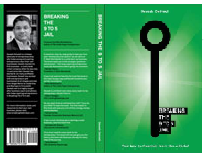Employee Turned Entrepreneur – Dallon Christensen
Posted Under: Entrepreneurship, Our Heroes
Today we are adding Dallon Christensen to our team of heroes under the “Our Heroes” series. Dallon spent 12 years in an assortment of corporate finance and accounting positions but felt that he was not fulfilling his passion. A teacher at heart, Dallon started a coaching business FirstStep Concepts and is now living out the life he always dreamed of. Read on for more that you can learn from Dallon’s story…
 DD: Who are you and what kind of corporate job were you at?
DD: Who are you and what kind of corporate job were you at?
DC: My name is Dallon Christensen. I have spent the past 12 years in a variety of corporate finance and accounting positions at a major Midwestern heavy equipment manufacturer. During my time with my corporate employer, I have participated in nearly every area of accounting one can imagine. I started my career in general accounting, handling the factory bookkeeping for a small factory. I then transferred to our corporate audit staff and worked 15 months out of my company’s European headquarters. Since returning to the United States in late 2002, I have supervised a cost accounting department, served as a product line financial analyst, participated as the accounting contact for a major enterprise software implementation, and currently handle the factory budgeting and forecasting responsibilities for two factories in my organization’s second-largest division.
DD: What made you leave the job? When did you realize that you wanted to be an entrepreneur & why?
DC: In 2007, I prepared a detailed proposal for our company to adopt statistical modeling for our capital investment projects as part of my MBA studies. At the time, our company had a poor record of delivering the financial goals for our investment projects. The problem was that we did not properly account for the inherent uncertainty of key variables like product costs and sales volumes. The project’s sponsor was preparing for retirement and did not give me an opportunity to pursue the project beyond my presentation. I realized at that time that my career needed to involve more creativity and less politics and bureaucracy.
As I was looking for opportunities in traditional employment, I did not find a position that truly fit my passion. I am a teacher at heart. I truly love teaching others how to make sense of the financial performance data they receive on a daily basis, and I wanted to work directly with business owners instead of navigating a traditional business structure. During the summer and fall of 2009, I thought very hard about what I wanted from my life and career. I decided that I wanted a career where I could combine my two loves: teaching and business. I also wanted a career where I could have the flexibility to participate in my children’s’ activities. I wanted the opportunity to structure my time in a way that I could place my family’s activities first and work in a variety of different settings.
DD: What did you do to break the corporate jail? How did you prepare yourself for the employee to entrepreneur transition?
DC: I have started FirstStep Concepts as a side business. I believe in starting a business slowly and using the operations cash flow to fund the business. My coaching business has extremely low overhead, so I am able to take my revenue and improve my marketing and continuing education. The initial months have been somewhat difficult. I am certainly in this business for the long-term, and that means I want to build relationships the right way. I will not sacrifice a long-term relationship for a short-term sale. I want my clients to feel like they can do business with me for years. I am also developing a number of educational classes and talking with many business leaders to understand the financial training needs of their employees. I am a strong believer in the flywheel concept from Jim Collins’ book “Good to Great”. While it can take time to start the flywheel turning, the momentum from continuing to turn the flywheel will eventually create an unstoppable force. I want my business to be like the flywheel.
DD: What are your top tips for employees who want to be entrepreneurs but are hung up on something?
DC: 1) Define how you want your entrepreneurial venture to fit into your overall life goals. Know how much money you would like to make, how many hours you would like to work and how you want your business to integrate with your life.
2) Create a weekly budget for all 168 hours of your week. This will force you to maximize every hour you spend during the week.
3) Take the appropriate time to exercise and eat right. I can easily notice when I have been exercising regularly and when I have not been exercising.
4) Create a planning process for your business. This does not necessarily mean you need to create a formal business plan, but you may do that if you are looking for external funding. You need to create goals and a financial plan so you can measure your actual performance against what you can expect.
5) Keep excellent accounting records, but do not rely solely on your financial statements to run your business. Develop non-financial goals that focus on items like lead generation and product returns if you sell products.
6) Always forecast and monitor your cash burn rate. Know how long your cash can last you if you do not generate any sales.
7) Build a “hill and valley” account that is the larger of six months of operating expenses or the amount of your largest capital purchase. In other words, if your operating expenses are $20,000 per month and your largest capital equipment purchase would be $100,000, try to have a fund of $120,000 available.
DD: How are you now? Are you still in same business, and how do you feel?
DC: I am very excited about my business. The economic crisis we have faced demonstrates the importance of sound business planning and performance management. Businesses need to look at more than just historical financial statements to run their businesses, and they need to develop the ability to anticipate and forecast the impact of future events. The United States small business economy has faced some challenges, but it is a very creative and resilient group. I have no doubts that we will all learn from the events of the past two years and become a stronger and smarter economy.
DD: Thank you Dallon, for sharing your entrepreneurial experiences with us. It is a pleasure to hear about how a desire to help your employer blossomed into an entrepreneurial project for you and how the economic challenges of the past few years can help us to learn and better our actions for the future. Good luck with FirstStep Concepts.
DC: Thank you Devesh for being interested in my story and for understanding how important entrepreneurs are these days. Hopefully I will be able to make a difference for the small business economy in American that has seen so much trouble in the last year or two. I wish you the best in all you do.
DD: That was Dallon Christensen everybody, an entrepreneur who is trying to bring the small business economy back to life. One of his realizations is a very common thread among entrepreneurs today: “I realized at that time that my career needed to involve more creativity and less politics and bureaucracy”.





